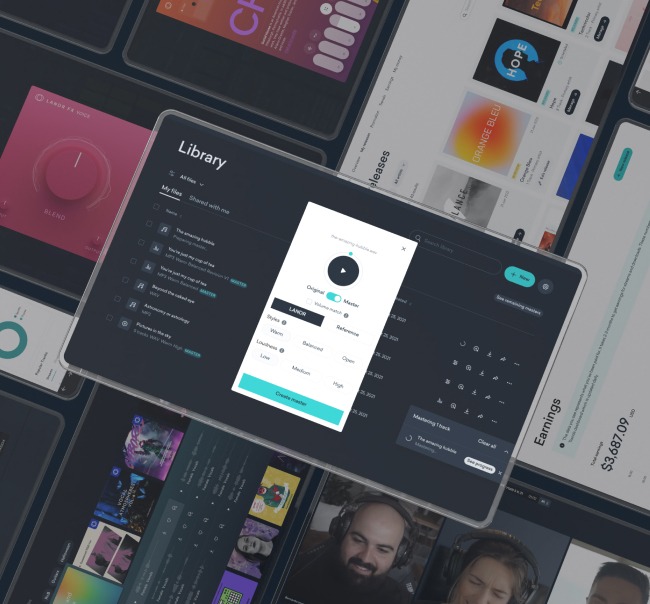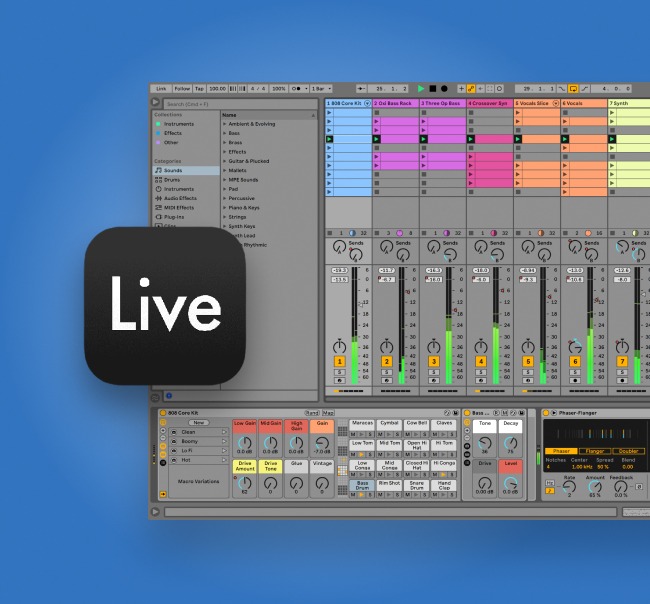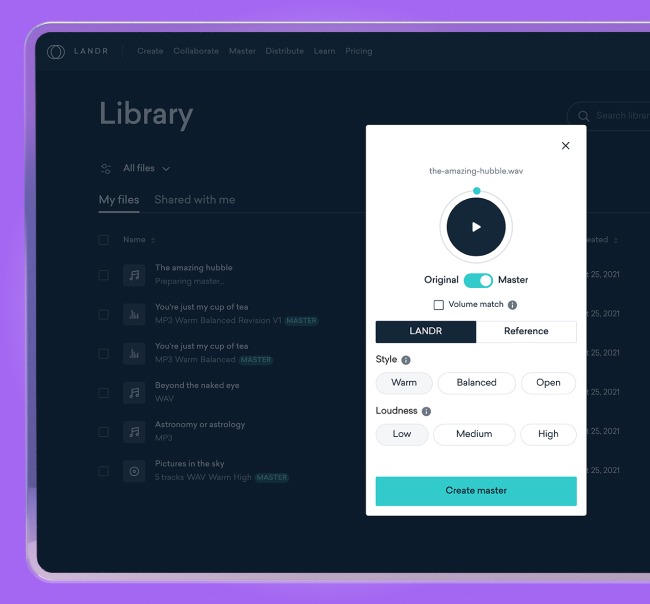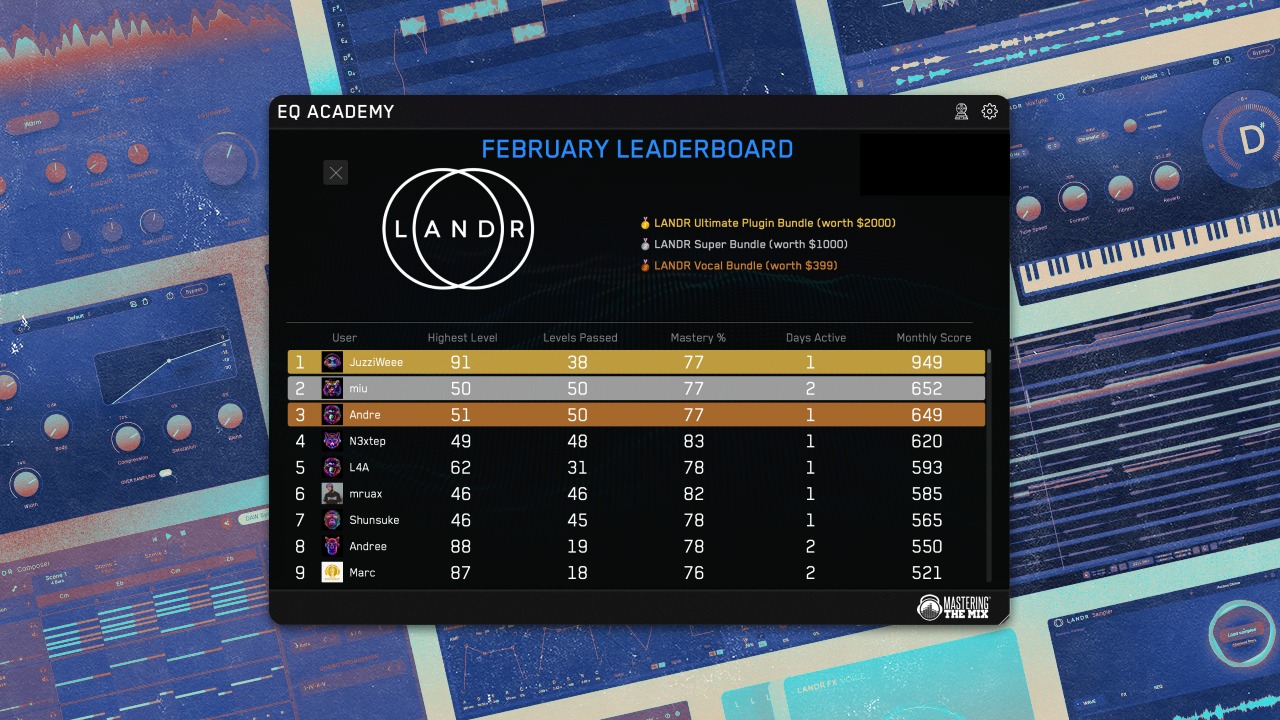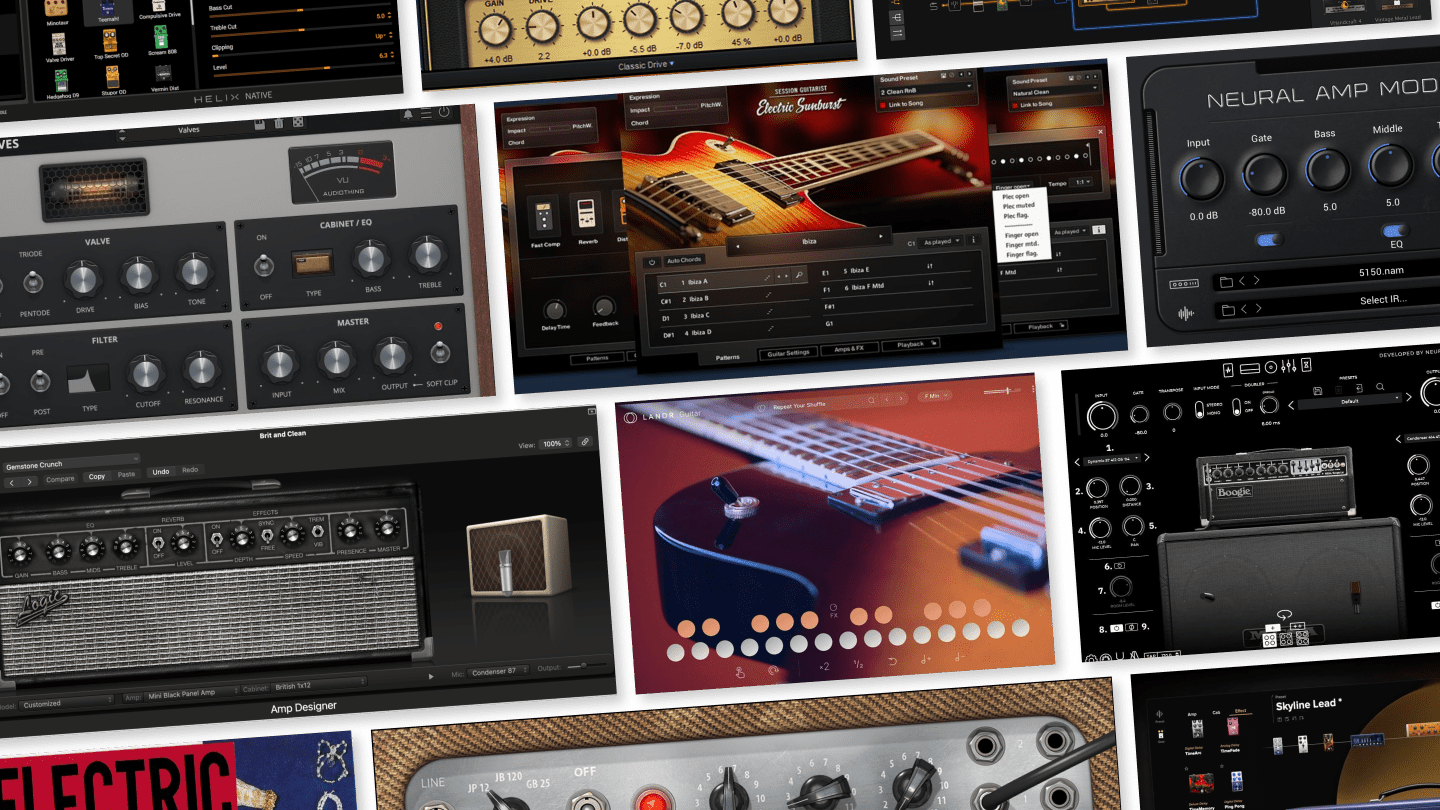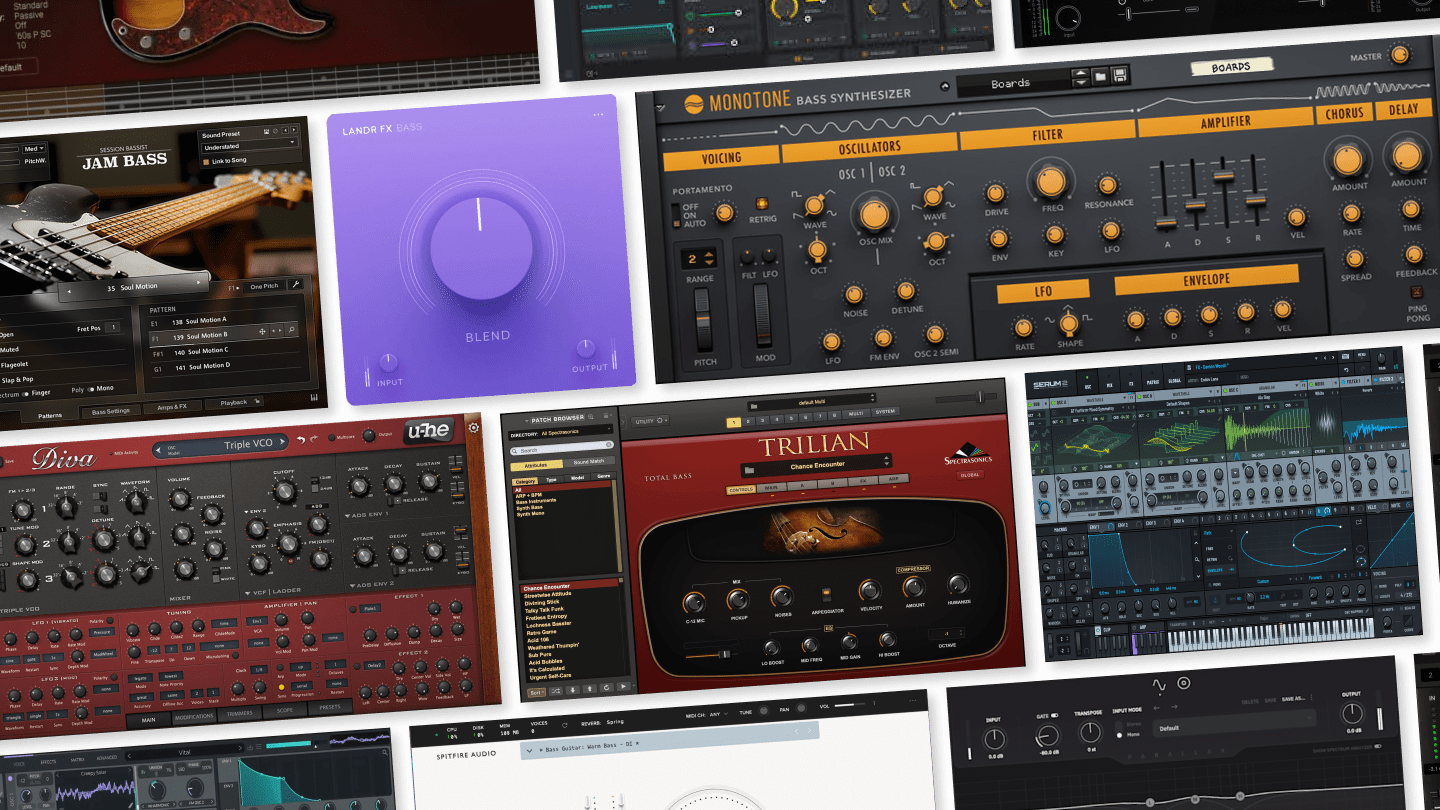
The 8 Best DJ Software for PC & Laptop 2026
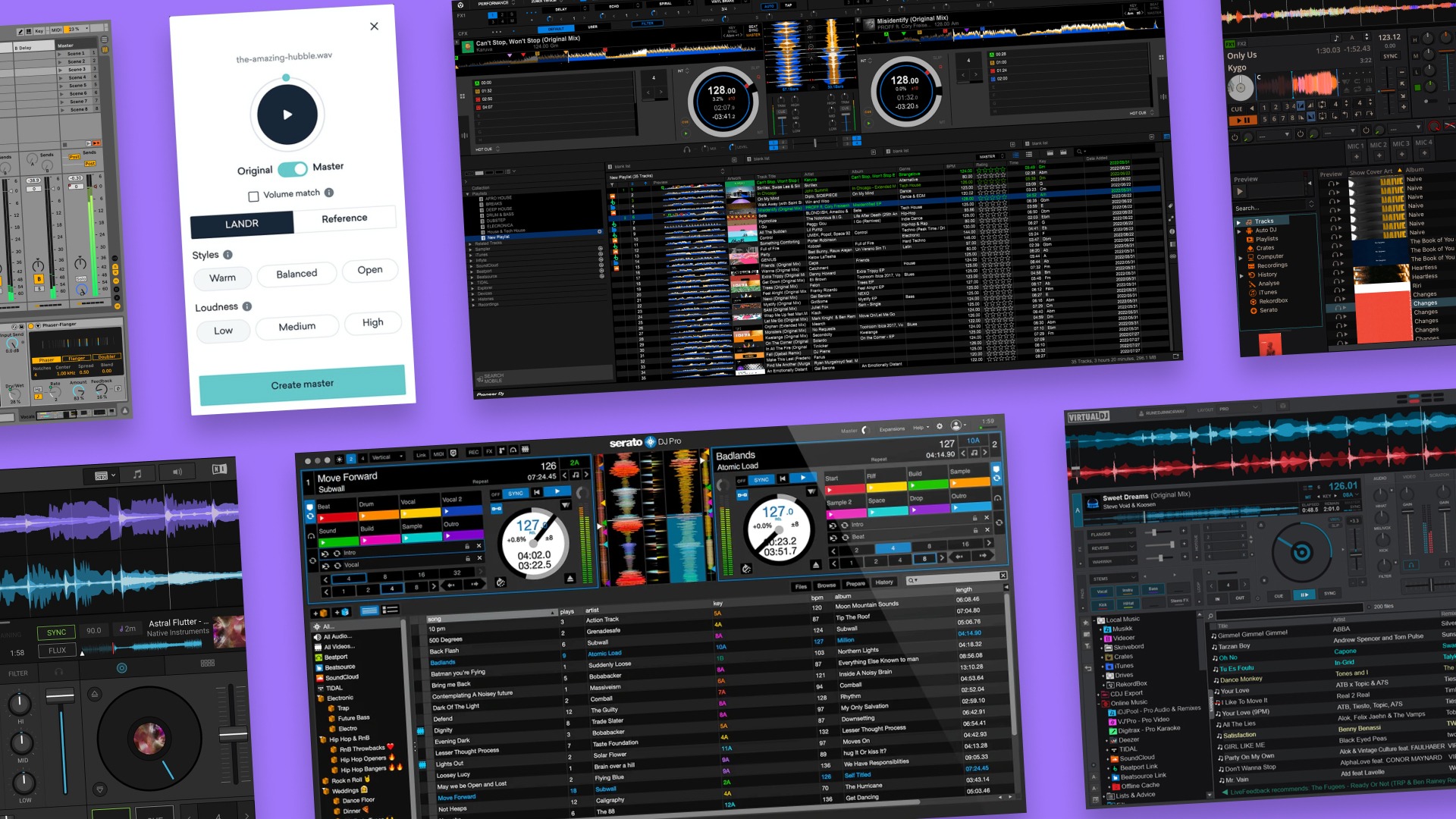
DJing is only getting more and more popular. So it’s no surprise that many DJs rely on at-home DJ software to both practice mixing, record performances and format their USB sticks.
The best part is that most basic versions of DJ software on this list come at no charge for their starter kits.
Of course, not all DJ software apps are made equally, each comes with its own set of features and considerations.
So if you’re looking for tools to get your DJ set locked in and ready to go here’s 7 DJ software apps that should be on your list.
Let’s dive in!
1. Pioneer Rekordbox
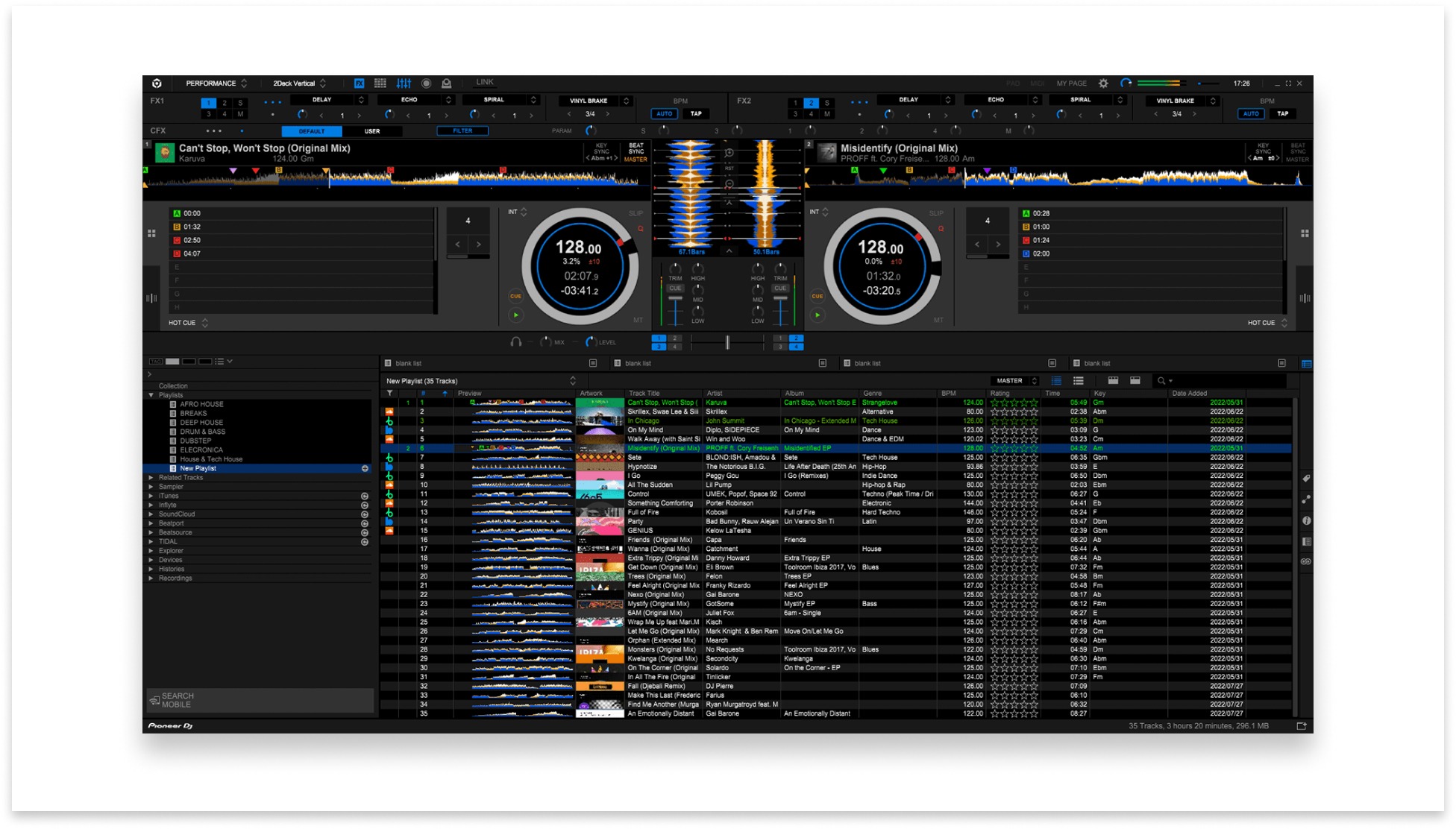
Rekordbox from Pioneer is definitely the standard for club DJs because it’s the only way to format your USB sticks for use with club-standard Pioneer CDJs.
If you want to DJ at your local nightclub on proper CDJs you can’t just roll up with a folder of .mp3s, you must use Rekordbox to format your USB stick properly.
Fortunately, Rekordbox’s base level is free to use, you can download it to your laptop right now, upload your music and format your USBs.
It also comes with some basic mixing features, so you can test out transitions between your tracks and get your DJ set locked in.
It also comes with some compatibility for Pioneer controllers, so if you own one or are looking to buy a DJ controller, Rekordbox is your go-to if you end up with a Pioneer brand controller.
For more advanced users, its paid version comes with cloud storage and better integrations, but if you’re just getting started local storage should be more than enough for your first few DJ sets.
Recent Updates to Rekordbox
- AI Vocal Detection: Rekordbox uses AI to accurately detect and analyze vocal positions within tracks, displaying these on the waveform for easier mixing and performance.
- Cloud Analysis: The software can retrieve track analysis information from the cloud, significantly reducing preparation time by quickly analyzing BPM, beatgrid, waveforms, and vocal positions.
- Automatic Cue Points: Rekordbox automatically configures personalized Hot Cues and Memory Cues based on user preferences, making advance preparation easier.
Pros:
- Free
- Comes with mixing software
- Open up access to CDJ formatted USBs
Cons:
- Not the most robust mixing tools
- Only integrates with Pioneer controllers
- Not oriented to live performances
2. Ableton Live
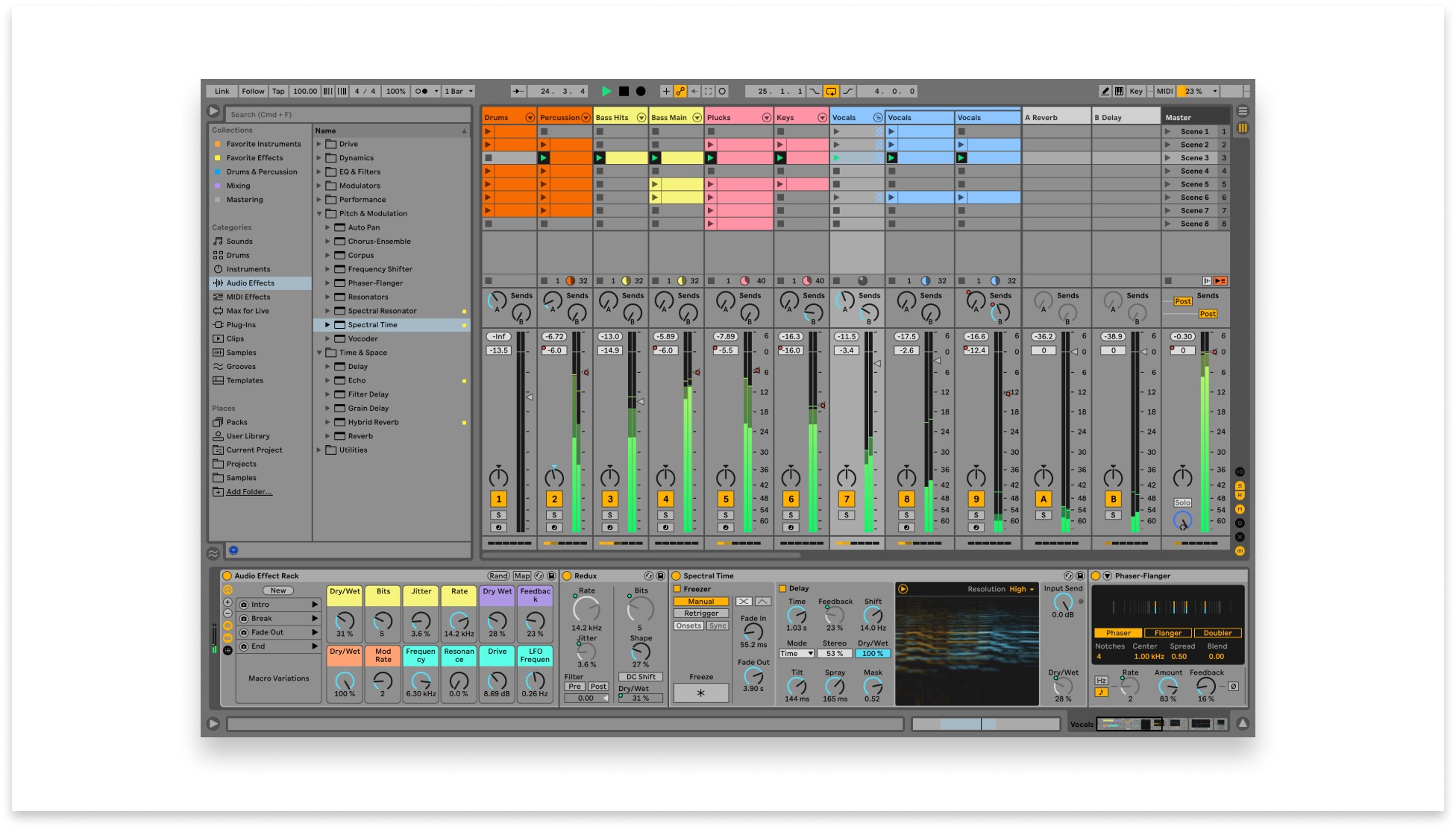
While Ableton Live is intended for use as a music creation DAW, it absolutely functions well as both a DJ software platform and as a DJ controller with Ableton Push.
That’s because its scene-based editing function makes it easy to mix between tracks and have a clear view of what’s happening in your DJ set.
Ableton Live is especially good if you wish to perform your own music or incorporate live performance into your DJ set since it robustly supports loops, finger drumming, keyboards and more.
Plus you can use all the plugins and effects you want to dial in your sound!
Ableton remains popular for its versatility in both music production and live performance. Recent updates have improved its DJing capabilities.
Recent Updates to Ableton Live
- Bounce to New Track: Ableton Live 12.2 introduces the “Bounce to New Track” feature, allowing producers to render time selections of tracks into new audio clips with ease.
- Redesigned Auto Filter: The Auto Filter has been overhauled with new creative filter types and improved modulation capabilities, enhancing sound design possibilities
Pros:
- The best for DJing your own music
- Great for live performances
- Included with LANDR Studio
Cons:
- DAW interface makes it more difficult to make changes to your set list
- Built as a DAW first and not fully fleshed out as DJ software
3. Native Instruments Traktor Pro 4
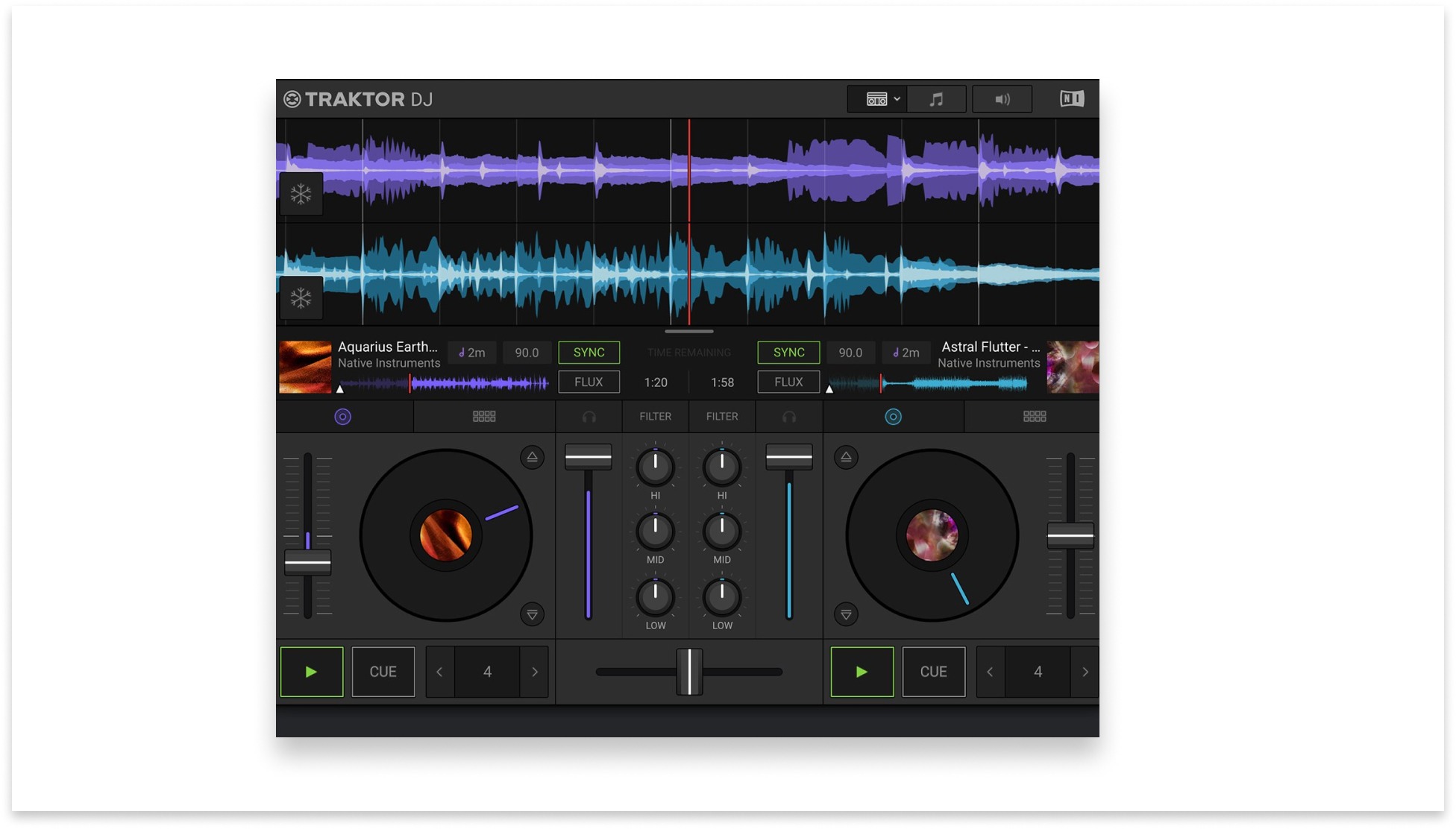
Native Instruments is the competitive option to Pioneer with its Traktor DJ software and companion Traktor DJ controllers.
It comes with a fairly robust software DJ app that works well for practicing at home—it also works for bringing to the club systems, since it’s contained with the laptop and will function with its portable controllers.
The main issue is that Traktor doesn’t really play nice with Pioneer CDJs, which are club standard and the go-to for most DJs.
Generally, DJs who use Traktor at home use it for practice and they’ll format their USBs to use on Pioneer DJ mixers at the club.
So, if you’re looking for a cost-friendly at-home practice setup, Traktor DJ is an excellent, free option.
Recent Updates for Traktor Pro 4
- Stem Separation: Traktor Pro 4 includes AI-powered stem separation, allowing DJs to isolate and manipulate individual elements of a track, such as drums, bass, instruments, and vocals. This feature is powered by iZotope’s RX technology, providing high-quality separation and visualization of each stem as individual waveforms.
- Flexible Beatgrids: This feature allows for seamless mixing between tracks with varying tempos. It accurately follows tempo changes throughout a track, enabling precise looping, beat-jumping, and effects layering without impacting audio quality.
- Ozone Maximizer: Borrowed from iZotope’s mastering software, this tool enhances the loudness of DJ sets in real-time while maintaining dynamic range and preventing distortion. It ensures that mixes sound polished and powerful.
- Pattern Player: This feature allows DJs to integrate percussion kits and samples from renowned producers into their sets. It functions as a mini drum machine, adding rhythmic elements to tracks and enhancing live performances.
- Unified Software Version: Unlike previous versions, Traktor Pro 4 is available as a single purchase, eliminating the need for subscriptions or additional purchases for features like the Pattern Player and Ozone Maximizer.
Pros:
- Very robust DJ software tools with all the trapping of modering digital DJing
- Free version is excellent for practicing
- Integrates perfectly with Traktor DJ controllers.
Cons:
- Not club standard and won’t integrate with Pioneer CDJs
4. PCDJ DEX 4
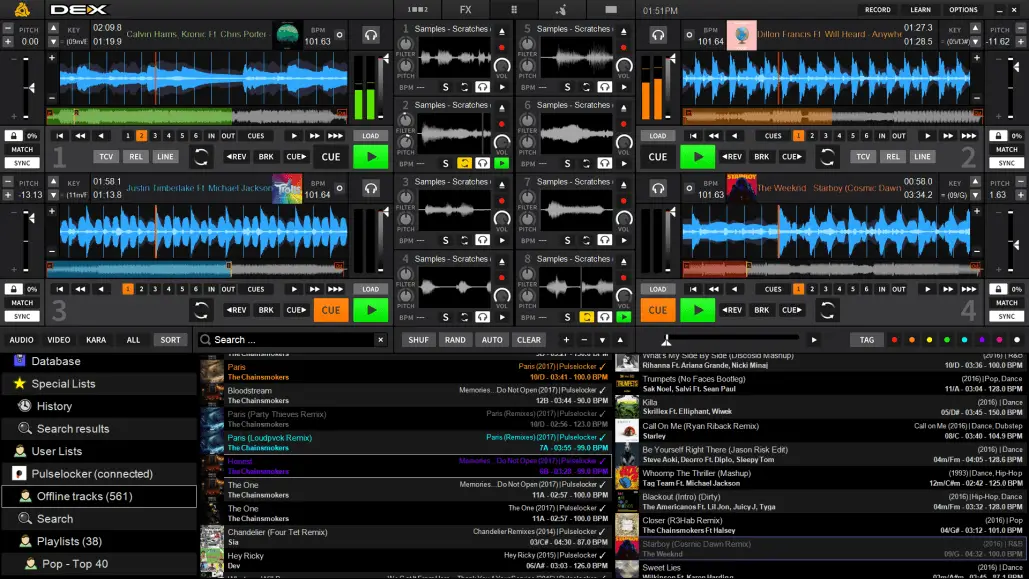
If you’re looking for a true all-in-one solution for live DJ performances, video mixing, and karaoke hosting, DEX 4 stands out as one of the most powerful and versatile DJ software platforms available today. It’s built for live performance and designed to give DJs total creative control, whether you’re mixing music videos, audio, or hosting karaoke nights.
DEX 4’s interface feels familiar if you’ve used traditional DJ decks, it offers two or four virtual decks, a full-featured mixer, and visual waveforms for precise beatmatching. You can mix with a mouse and keyboard or connect one of over 100 supported DJ controllers for a hands-on experience.
What makes DEX 4 stand out is its versatility. DEX 4 let’s you mix and transition between video and audio seamlessly or overlay visuals on top of your set. It even supports automix and beat-sync, making it great for both beginners who want smooth transitions and pros who want tight control over their mixes.
Karaoke hosts will also appreciate the integrated KJ module, which includes singer rotation management, on-screen lyrics display, and support for all major karaoke file formats.
Recent Updates to PCDJ DEX 4
- AI Track Separation: DEX 4 recently added real-time stem separation, allowing DJs to isolate vocals, drums, and instruments for remixing and mashups on the fly.
- Video Effects Engine: The new effects module brings enhanced transitions, text overlays, and visual FX that can sync with your beat grid.
- Performance Boosts: Updated 64-bit architecture and GPU acceleration improve stability and responsiveness, even with high-resolution video content.
- Cloud Library Access: Integrations with services like Pulselocker and PartyTyme expand your instant-access library for DJ and karaoke content.
Pros:
- Excellent for mixing music, video, and karaoke
- Real-time stem separation and video FX
- Broad controller compatibility
Cons:
- Paid software with no free tier
- Slightly heavier on system resources for video use
5. Serato DJ Pro
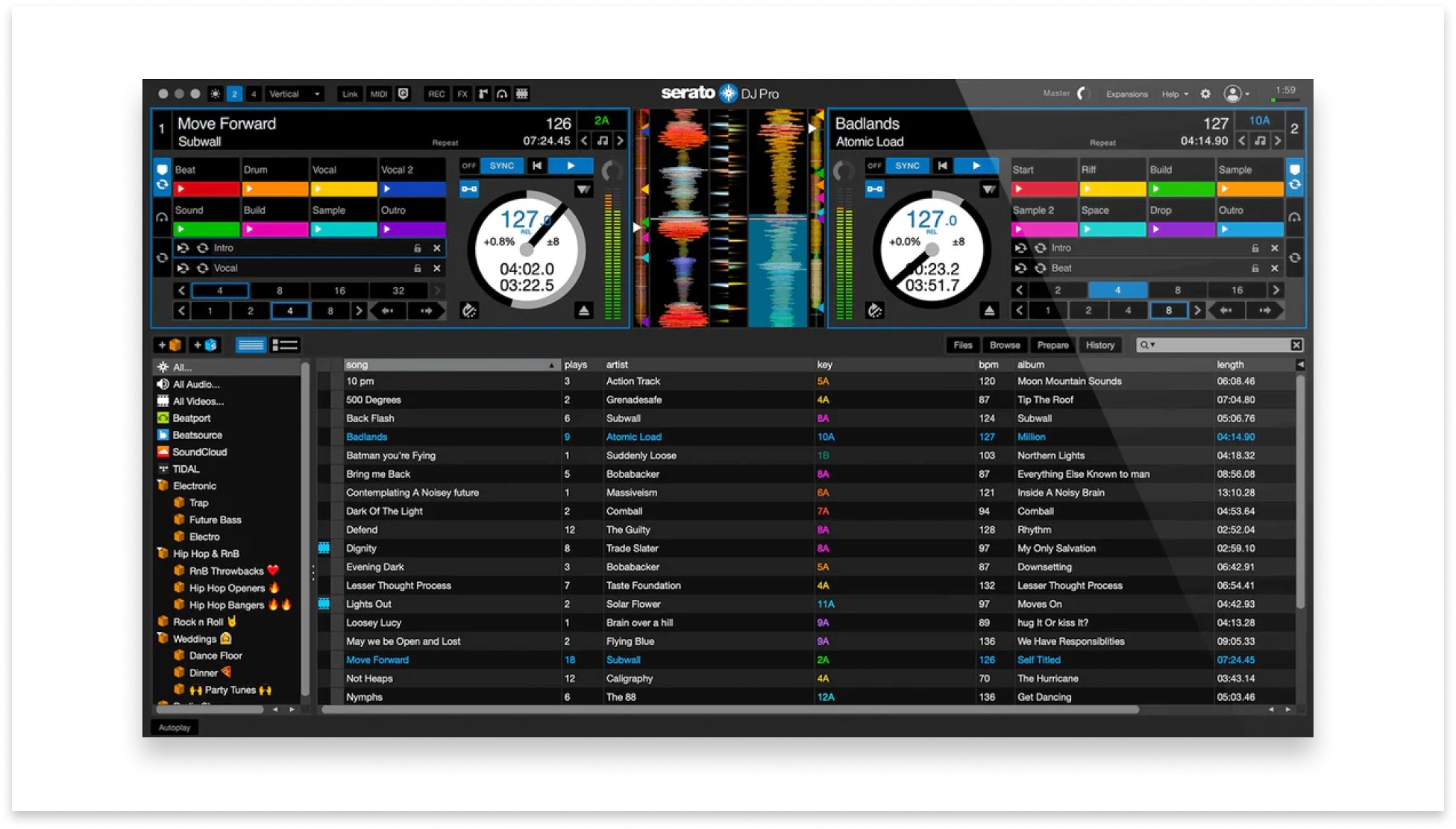
Serato DJ Pro is the best, most well-built DJ software platform right now, that’s why you have to pay for it.
Unfortunately, there is no free version of Serato DJ Pro. But, you get good value for your money because it’s the best DJ app and it integrates perfectly with Pioneer controllers.
That means you can practice DJing on Serato with a Pioneer CDJ controller and anyone can bring their own USB and start DJing their set on your set up.
If you’re looking for a cost-friendly way of hosting a DJ event without renting expensive CDJs, pairing a Pioneer DJ controller with Serato DJ pro is your absolute best bet.
Recent Updates in Serato DJ Pro
Serato DJ Pro has recently introduced several updates that enhance its performance and creative capabilities for DJs. Here are some of the key updates:
- Serato Stems: This feature allows DJs to isolate and manipulate individual elements of a track, such as vocals, melody, bass, and drums, in real-time. It enables the creation of acapellas or instrumentals on the fly, facilitating seamless transitions and mashups.
- Enhanced Hardware Integration: The latest version of Serato DJ Pro offers improved compatibility with a wide range of hardware, including the AlphaTheta DDJ-GRV6 controller. This ensures a more intuitive and responsive experience for DJs5.
- Advanced Performance Tools: The update includes expanded FX options, customizable user interfaces, and enhanced library management tools. These features enable DJs to deliver more dynamic and personalized sets.
- Native Apple Silicon Support: Serato DJ Pro now supports Apple M1, M2, and M3 computers, providing smoother operation and enhanced performance for users with these newer processors.
- Enhanced Effects Suite: The software includes new custom-built effects like Infinity Tone, Spiral Echo, Stretch, Vast Reverb, and Infinity Flanger. Additionally, the Roll Out effect has been revived with improved sound quality.
- Custom FX: Users can create, save, and manage their own effects presets, allowing for personalized soundscapes. This feature is available with the Suite or Expansion packs.
- Multi-Platform Compatibility: Serato DJ Pro now supports a range of non-Serato controllers, including the Native Instruments Traktor Kontrol S2 MK3 and S3, and the Pioneer DJ DDJ-200 and DDJ-400. This expands the software’s versatility for more DJs.
- Phase HID Integration: Serato has collaborated with Phase to offer a seamless turntable setup using HID protocol, providing a stable and low-latency connection that enhances turntable mixing capabilities.
Pros:
- The best DJ software
- Integrates with Pioneer and Serato controllers
Cons:
- Not free
6. LANDR Mastering
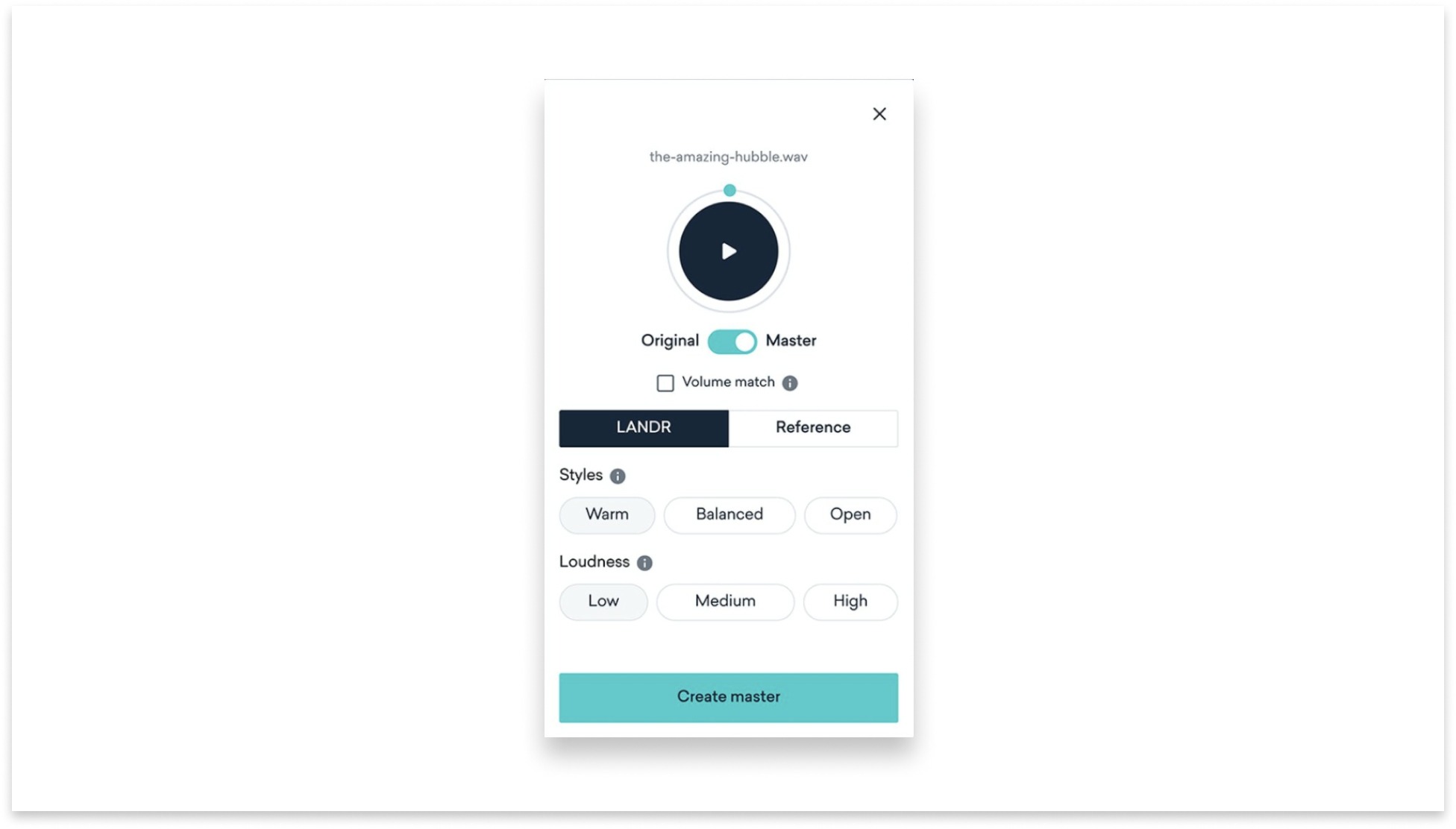
LANDR Mastering is not a DJ controller software platform, but it is a huge secret ingredient for many professional DJs, especially ones that like to use unmastered audio ripped from old vinyls.
That’s because vinyl recordings are often mastered much quieter than modern music—and you need a mastering tool to get vinyl ripped tracks up to modern loudness levels without ruining the mix.
Because pro subscriptions to LANDR Mastering offer unlimited, incredibly quick, high-quality .WAV masters, many DJs use the service to make sure their tracks are uniformly loud and will punch through on club speakers.
So if you need to make sure your tracks are loud enough, check out LANDR Mastering—right now you can preview a master any track for free, so give it a try!
Pros:
- Your DJ set will legitimately sound better
- You can rip as much vinyl and master it as you want
Cons:
- It’s not a DJ controller software program
7. Virtual DJ
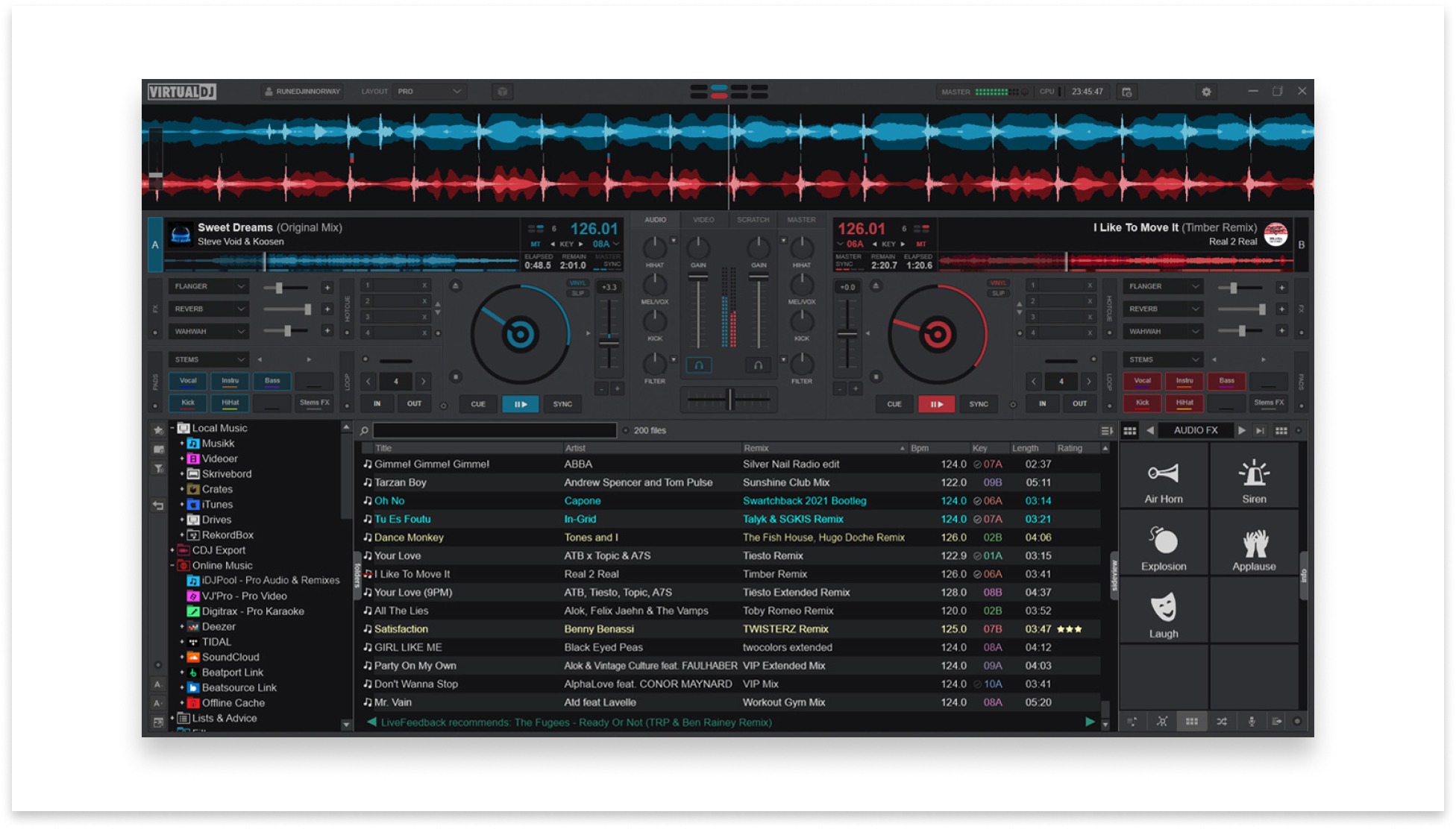
Here’s another free DJ tool that’s a great starting point for learning how to DJ at home.
Virtual DJ is a well-developed option for practicing your mix, making selections and honing in your set.
It also integrates well with most major DJ controllers, including the smaller more affordable controllers.
If you’re getting started and picked up a mini-controller, Virtual DJ is a good option with great features.
And, once you build up your skills on it, Virtual DJ’s paid version is very competitive with more advanced DJ software platforms.
Recent Updates to Virtual DJ
- Improved Controller Support: Virtual DJ continues to expand its support for a wide range of DJ controllers, ensuring seamless integration with most major brands. This allows users to easily connect their hardware and start mixing.
- Enhanced Effects and Transitions: The software now includes more advanced effects and transition tools, enabling DJs to create smoother and more dynamic mixes. These effects can be customized and saved for future use.
- Advanced Beatmatching and Syncing: Virtual DJ has refined its beatmatching algorithms, providing more accurate and stable syncing between tracks. This feature helps maintain a consistent beat throughout performances.
- User Interface Updates: The interface has been updated to be more intuitive and user-friendly, making it easier for beginners to navigate while still offering advanced features for experienced DJs.
- Streaming Integration: Virtual DJ now supports live streaming directly from the software, allowing DJs to broadcast their performances to platforms like YouTube, Facebook, and Twitch with ease.
- Karaoke Mode: A dedicated karaoke mode has been added, which includes features like vocal removal and pitch adjustment, making it suitable for karaoke events.
Pros:
- Free version is easy to learn and use
- Integrates with all major DJ controllers
Cons:
- Not as robust as well integrated with top-tier DJ hardware
- Not club standard
8. Mixxx
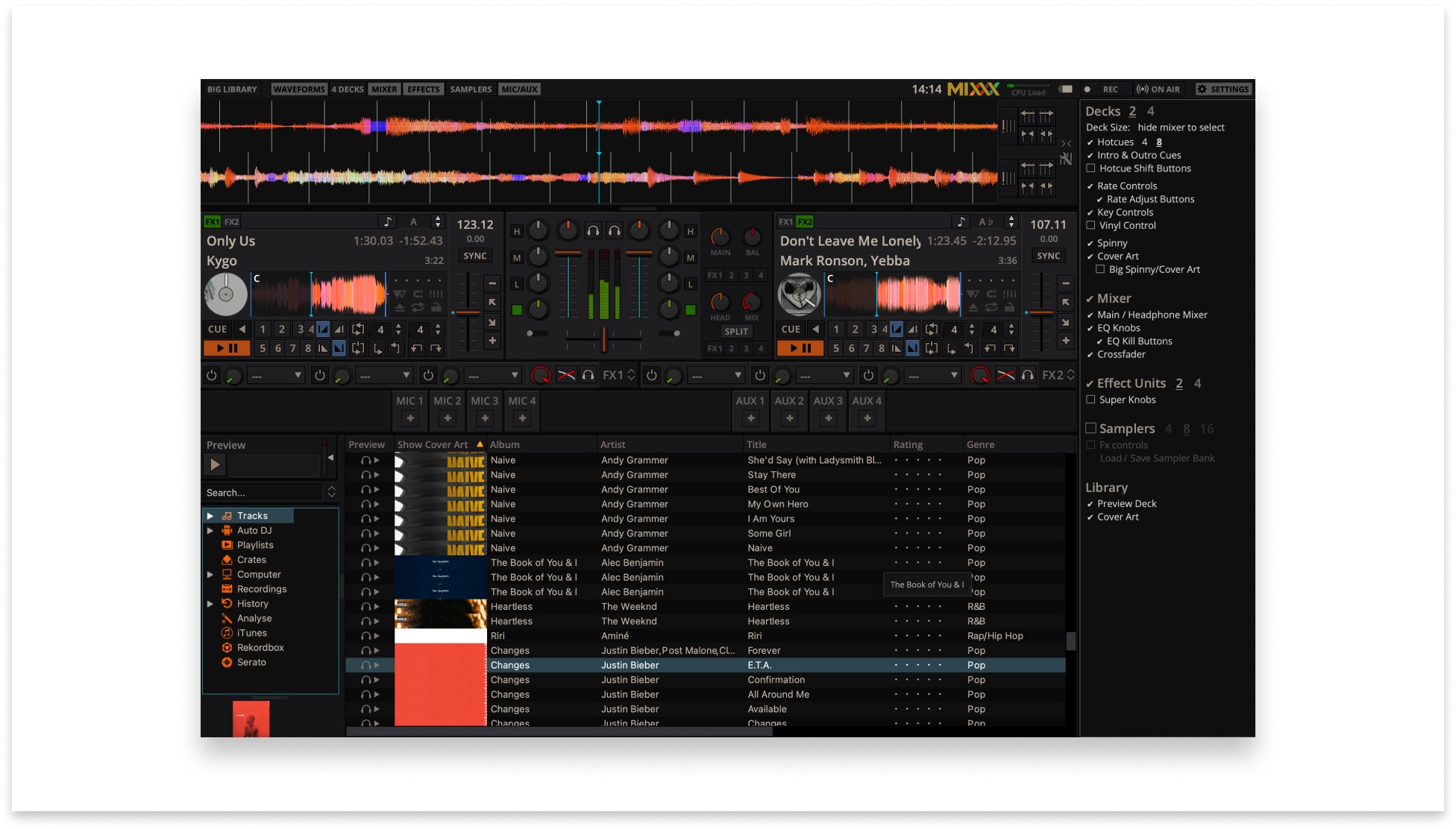
Mixxx is another free and open-source DJ software program that makes it super easy to mix on your computer.
Because it’s open source, the free version comes with a surprising number of features and is generally more advanced compared to other free options.
It’s also well integrated with most DJ controllers.
Recent Updates to Mixxx DJ Software
- Qt 6 Framework: Mixxx 2.5 has transitioned to the Qt 6 framework, providing a modern and stylish graphical user interface. This upgrade enhances performance, stability, and compatibility on modern systems, including better support for high-resolution displays.
- Controller Support: The software now offers improved controller mappings for devices like the Denon MC7000, Numark Scratch, Pioneer DDJ-FLX4, and Traktor Kontrol S4 MK3. This ensures seamless integration with a wide range of DJ controllers and turntables.
- Audio Effects: Mixxx 2.5 introduces new audio effects, including a compressor and glitch effect. Additionally, it supports Audio Unit (AU) plugins on macOS, expanding the range of available effects and virtual instruments.
- Library Management: The update includes enhanced library management features, such as better search filters, smart crates, and improved metadata editing. It also supports importing cue points from Serato and Rekordbox libraries, making it easier for DJs to transition from other platforms.
- Waveform Display: The waveform display has been enhanced with features like a split waveform for the censor function and visualizing slip mode positions. Users can also see beats and time until the next marker in the waveform.
- Undo Function for BPM Changes: This feature allows users to undo the last BPM/beats change, making it easier to correct tempo analysis.
- Beat Loop Anchor: A new beat loop anchor has been added for more precise editing of loops, allowing loops to be set and adjusted from either the start or end.
- User Interface Improvements: The menu bar can now be toggled on and off to save space on small screens. Users can also edit track titles and artists directly within the decks via a delayed double-click.
Pros:
- The most advanced free option
- Open source makes creates lost of customization options
- Great for practicing at home
Cons:
- Dated UX compared to newer DJ software
- Not club standard
DJ Software Guide
What is DJ Software?
DJ software is like the digital command center for all your DJing needs, it’s the virtual turntable setup you need to mix music in a live club or party environment, but with a bunch of extra tools and functions.
Ready to get the party started but still wondering, what exactly goes into a DJ software platform anyway?
No worries. We’re here to break it down for you in the simplest way possible.
Digital turntables and beyond
Old-school DJs had to lug around crates of vinyl records and set up hefty turntables.
With DJ software, you can chuck all that physical stuff. Your laptop or even your iPad can become a full-on DJ setup.
The software lets you mix, scratch, loop, and add effects to music tracks, just like you would with physical equipment.
Ease of use
One of the best things about DJ software is that it often comes with a user-friendly interface.
Sure, there’s a learning curve, but most software has intuitive controls and easy-to-navigate menus. So you can focus on the fun part—mixing killer tracks.
Versatility is key
DJ software is versatile. Whether you’re mixing hip-hop, techno, or throwing in some oldies for good measure, the software adapts.
Many offer pre-configured settings for various genres, so you’re not stuck fiddling with dials when you should be dropping the beat.
Connectivity
Worried about hardware? Don’t be.
Most DJ software can be easily hooked up to your existing DJ gear, like mixers, controllers, and even those old-school turntables if you’re going retro. It’s all about giving you options.
So, if you’re just starting your journey in the world of DJing or you’re an old hand looking for a change, DJ software is where it’s at.
From functionality to convenience, it’s the tool that can elevate your sets and keep the party going all night long.
Wrap it up
So there you have it, folks—your quick guide to DJ software.
We’ve wandered through the digital aisles, checking out the game-changing features that make each platform unique.
From catering to the needs of beginner DJs to satisfying the tech-savvy cravings of experienced mixologists, DJ software brings something to the table for everyone.
And let’s not forget our creative DJs out there. Remixing tracks on the fly is a piece of cake with the right software.
Add your personal touch to existing tracks, and who knows? You might just create the next big hit.
So what are you waiting for? Whether you’re a newbie starting your first gig or a seasoned pro, dive in and explore the world of DJ software. It’s like a playground for your musical creativity.
If you’re looking for a true all-in-one solution for live DJ performances, video mixing, and karaoke hosting, DEX 4 stands out as one of the most powerful and versatile DJ software platforms available today.
And hey, if you’ve remixed your tracks or made your own, don’t forget that LANDR’s got your back. Get your tracks sounding like the pros before hitting the decks. Happy mixing!
Gear guides, tips, tutorials, inspiration and more—delivered weekly.
Keep up with the LANDR Blog.
